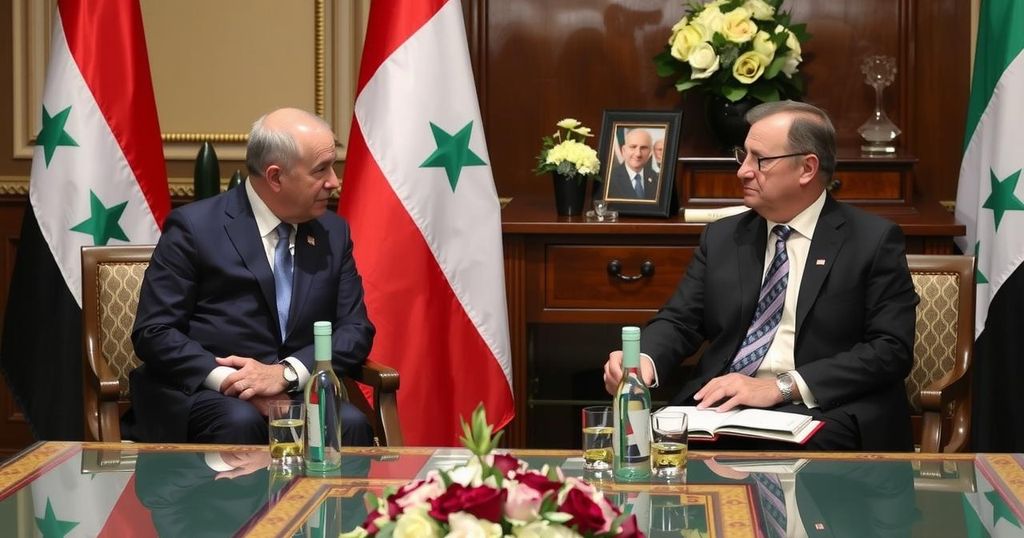In a groundbreaking meeting, Jordan’s Foreign Minister Ayman Safadi discussed support for Syria’s reconstruction with new leader Ahmed al-Sharaa, emphasizing cooperation in trade, security, and aid. This marks Jordan’s first high-level diplomatic visit to Syria post-Assad, as Jordan seeks stability and resolution of issues related to Syrian refugees.
In a significant diplomatic engagement, Jordanian Foreign Minister Ayman Safadi met with Syria’s new leader Ahmed al-Sharaa in Amman, reaffirming Jordan’s commitment to assist in Syria’s reconstruction. This visit marked the first by a senior Jordanian official since the ousting of Bashar al-Assad. The discussions centered on enhancing cooperation in areas such as trade, border management, humanitarian aid, electricity, and security, expressing support for a government that is representative of all segments of Syrian society.
Safadi emphasized the notion of a collaborative effort among Arab nations to support Syria’s rebuilding without external interference. “We agree to support the Syrian people in rebuilding their state,” he stated, indicating that the drafting of a new constitution was part of the envisioned reforms. This dialogue comes on the heels of a recent summit in Jordan where regional and international diplomats advocated for a peaceful transition in Syria following years of conflict.
Ahmed al-Sharaa, leading the Islamist group Hayat Tahrir al-Sham, has recently engaged with various regional officials, signaling a potential shift in diplomatic relations. Jordanian officials, including government spokesman Mohamed Momani, reiterated the importance of security and stability in Syria for Jordan’s own border security and expressed solidarity with the Syrian populace.
In a noteworthy development, a number of Syrian refugees have begun returning to their homeland, with over 7,000 reported departures from Jordan since the outbreak of war in 2011. Safadi affirmed Jordan’s ongoing commitment to support the remaining Syrian refugees, underscoring that any return must be voluntary. Jordan has also tightened its border controls amid challenges related to drug and arms smuggling, particularly concerning the proliferation of captagon, a dangerous stimulant widely sought in the Gulf nations.
The diplomatic relationship between Jordan and Syria has been historically significant, particularly following the civil unrest in Syria that began in 2011. Jordanians have close cultural and familial ties with Syrians, which has led to a considerable influx of refugees fleeing the violence. With over 1.3 million Syrian refugees residing in Jordan, the country has managed a delicate balance between providing humanitarian support and ensuring national security. Jordan’s strategic interest lies in restoring stability in Syria, not only for humanitarian reasons but also to safeguard its own borders and security framework. In recent months, there has been a renewed focus among Arab nations to engage with the Syrian government, exemplified by high-level visits and discussions aimed at rebuilding the war-torn nation. The external pressures of drug trafficking and the urgency for stability have driven Jordan to take proactive diplomatic initiatives, emphasizing the importance of a stable neighbor for its own national security and regional cooperation.
The dialogue between Jordan and Syria’s new leadership signifies a critical step toward renewed cooperation and stability in the region. Jordan’s commitment to assist in Syria’s reconstruction while simultaneously addressing the concerns of refugees illustrates a balanced approach to foreign policy. As discussions continue regarding the future governance of Syria, the emphasis on inclusivity and regional support reflects a collective intent focused on fostering peace and rebuilding a nation severely affected by conflict. This engagement marks a pivotal moment in Middle Eastern diplomacy, underscoring the interconnectedness of security and humanitarian efforts in the region.
Original Source: www.france24.com






